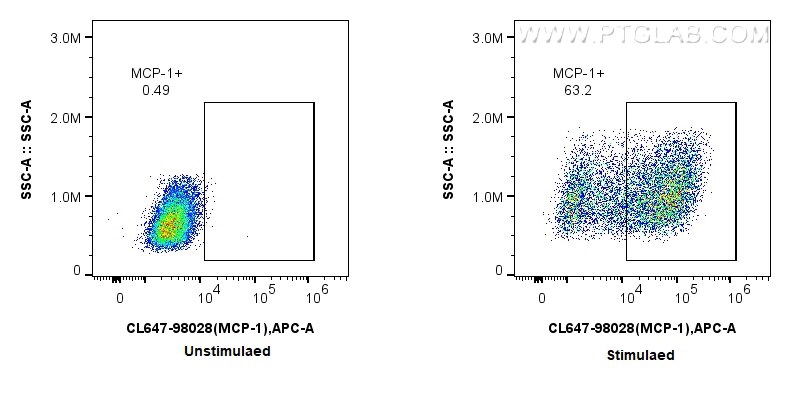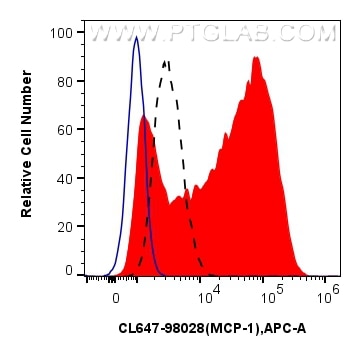Validation Data Gallery
Tested Applications
| Positive FC (Intra) detected in | LPS and Brefeldin A treated RAW 264.7 cells |
Recommended dilution
| Application | Dilution |
|---|---|
| Flow Cytometry (FC) (INTRA) | FC (INTRA) : 0.25 ug per 10^6 cells in 100 μl suspension |
| This reagent has been tested for flow cytometric analysis. It is recommended that this reagent should be titrated in each testing system to obtain optimal results. | |
| Sample-dependent, Check data in validation data gallery. | |
Product Information
CL647-98028 targets MCP-1/CCL2 in FC (Intra) applications and shows reactivity with mouse samples.
| Tested Reactivity | mouse |
| Host / Isotype | Rabbit / IgG |
| Class | Recombinant |
| Type | Antibody |
| Immunogen |
CatNo: Eg0427 Product name: Recombinant Mouse MCP-1/CCL2 protein (His Tag) Source: mammalian cells-derived, pHZ-KIsec-C-6*HIS Tag: C-6*HIS Domain: 24-148 aa of NM-011333 Sequence: QPDAVNAPLTCCYSFTSKMIPMSRLESYKRITSSRCPKEAVVFVTKLKREVCADPKKEWVQTYIKNLDRNQMRSEPTTLFKTASALRSSAPLNVKLTRKSEANASTTFSTTTSSTSVGVTSVTVN 相同性解析による交差性が予測される生物種 |
| Full Name | chemokine (C-C motif) ligand 2 |
| GenBank accession number | NM-011333 |
| Gene Symbol | MCP-1/CCL2 |
| Gene ID (NCBI) | 20296 |
| RRID | AB_3673666 |
| Conjugate | CoraLite® Plus 647 Fluorescent Dye |
| Excitation/Emission maxima wavelengths | 654 nm / 674 nm |
| Form | |
| Form | Liquid |
| Purification Method | Protein A purification |
| UNIPROT ID | P10148 |
| Storage Buffer | PBS with 0.09% sodium azide{{ptg:BufferTemp}}7.3 |
| Storage Conditions | Store at 2-8°C. Avoid exposure to light. Stable for one year after shipment. |
Background Information
Monocyte chemotactic protein 1 (MCP-1), also known as CCL2, is chemotactic for monocyte/macrophage, B cell, and T cell, and belongs to the CC subfamily of chemokines. Chemokines are a superfamily of secreted proteins involved in immunoregulatory and inflammatory processes. The human ortholog has been implicated in the pathogenesis of diseases characterized by monocytic infiltrates, such as psoriasis, rheumatoid arthritis, and atherosclerosis.
Protocols
| Product Specific Protocols | |
|---|---|
| FC protocol for CL Plus 647 MCP-1/CCL2 antibody CL647-98028 | Download protocol |
| Standard Protocols | |
|---|---|
| Click here to view our Standard Protocols |


